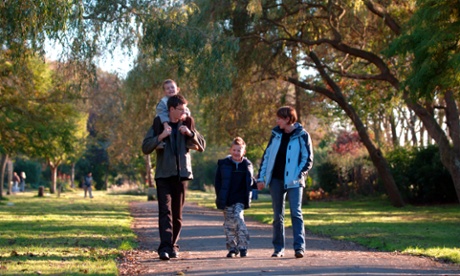
Encouraging men to become more involved as fathers is the key to achieving gender equality, according to a landmark international study that shows women remain overwhelmingly more responsible for childcare and domestic duties despite their increasing role in paid employment.
Hands-on fathers also help produce happier and better-educated offspring, as well as gaining significant benefits to their own physical and mental health, the inaugural State of the World’s Fathers report argues.
The 288-page report, an analysis of almost 700 studies on the subject from every nation for which data is available, highlights the continuing gender disparities over childcare and other domestic duties.
Despite now being 40% of formal workforce globally, women still spend between two and 10 times longer then men caring for children or older people, and there is no country where men and boys share unpaid domestic and care work equally with women and girls.
A key part of the problem is a lack of official support for involved fatherhood, with paid paternity leave either non-existent or very brief in most counties, said the report, produced by Mencare, an international NGO campaigning on fatherhood that has links to groups including Promundo and Save the Children.
“Unless men and boys participate equally in unpaid work in the home, and unless governments, employers and families expect and support this involvement, gender equality will not be achieved,” it argues. “Men’s emotional lives and their wellbeing and happiness will continue to be constrained, and they and their children will miss out on one of the most significant relationships of their lives.”
The study, published to coincide with Father’s Day this Sunday, identifies the massive gender imbalance in childcare and other unpaid domestic work as a key element of the problem. Even across the developed nations of the OECD women undertake an average of twice as much domestic duties as do men, with the ratio rising to eight times as much in South Africa and 10 times more in India.
One study cited by the report found that even between 1965 and 2003, married, employed men in 20 industrialised nations, including the UK and US, contributed on average only an extra six hours a week to domestic chores. Nowhere did the time spent by men exceed 37% of that of women.
This disparity helped explain why women earn on average 24% less than men around the globe, the report noted. Father who participate in childcare and other domestic duties tend in turn to bring up boys more likely to accept equality, it added, while the daughters of men who share domestic chores are more likely to aspire to higher-paying jobs.
The report’s authors call for governments to introduce more ambitious paternity leave entitlements. While more than two-thirds of fathers say they would happily work less to spend more time with their children, of the 92 nations currently giving paternity leave about half offer less than three weeks. More generous provision has “the potential to transform gender relations”, the study argues, noting UK research that found fathers who took time off after their children’s birth were much more likely to help with duties like night feeds even a year later.
The report stresses the wider beneficial effects of more paternal involvement, saying involved fathers have been shown to boost their children’s cognitive development, mental health and social skills. Men who say they have close connections with their children tend to live longer, happier lives, and are more productive at work.
More benefits still occur when fathers are actively involved before their children’s birth, the study found, with men’s presence at antenatal visits being linked with fewer woman dying in childbirth and, in more developed nations, with better rates of breastfeeding.
While 80% of men around the world will become a biological father during their lives, the authors say, the issue of more parental and domestic involvement by men is “virtually invisible in public policies and in public discourse”.
Nikki van der Gaag, an academic and author who co-wrote the report, said the findings were crucial in efforts to boost equality: “When fathers take on their fair share of the unpaid care work, it can alter the nature of the relationships between men and women and children, as both fathers and mothers will have more time for their children, women are released from some of their double burden, and fathers get to experience the joys, satisfactions, and stresses of caring for their children.
“Taking up roles as caregivers also offers men the opportunity to begin to break free from the narrow concepts of manhood and fatherhood, providing their sons and daughters with positive role models, improved health and development, and higher hopes for the future.”

